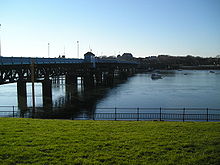Walney Island: Difference between revisions
No edit summary |
No edit summary |
||
| Line 5: | Line 5: | ||
The island lies in the [[Irish Sea]] to the west of the [[Furness]] peninsula in north-west England. Until [[1974]] both the island and the peninsula were a detached part of the county of [[Lancashire]] but are now in [[Cumbria]], the island being part of the [[Barrow-in-Furness (borough)|borough of Barrow-in-Furness]] to which it has been connected by bridge (Jubilee Bridge) since [[1908]]. Prior to the bridge a ferry was used to transport the workers. |
The island lies in the [[Irish Sea]] to the west of the [[Furness]] peninsula in north-west England. Until [[1974]] both the island and the peninsula were a detached part of the county of [[Lancashire]] but are now in [[Cumbria]], the island being part of the [[Barrow-in-Furness (borough)|borough of Barrow-in-Furness]] to which it has been connected by bridge (Jubilee Bridge) since [[1908]]. Prior to the bridge a ferry was used to transport the workers. |
||
[[Image:Sunset from West Shore, Walney.JPG|thumb |
[[Image:Sunset from West Shore, Walney.JPG|thumb|Autumn sunset from West Shore, Walney]] |
||
Despite not being joined to the mainland by bridge until 1908, axe and arrow heads that date from the [[bronze age]] have been found on Walney. So people have been living on the island for at least somewhere around 3,000 years. The name Walney comes from the [[Old Norse]] valna ey, which means 'Isle of the British'. This name would have been given when [[Norsemen|Norse]] settlers were present in the area during the [[Viking Age]]. One of the main areas of settlement, Biggar Village has been inhabited since at least the [[11th Century]], as it is mentioned in the [[Domesday Book]] (as Hougenai). |
Despite not being joined to the mainland by bridge until 1908, axe and arrow heads that date from the [[bronze age]] have been found on Walney. So people have been living on the island for at least somewhere around 3,000 years. The name Walney comes from the [[Old Norse]] valna ey, which means 'Isle of the British'. This name would have been given when [[Norsemen|Norse]] settlers were present in the area during the [[Viking Age]]. One of the main areas of settlement, Biggar Village has been inhabited since at least the [[11th Century]], as it is mentioned in the [[Domesday Book]] (as Hougenai). |
||
Revision as of 21:49, 1 October 2007
Walney Island, also known as the Isle of Walney, is the eighth largest marine island in England.

The island lies in the Irish Sea to the west of the Furness peninsula in north-west England. Until 1974 both the island and the peninsula were a detached part of the county of Lancashire but are now in Cumbria, the island being part of the borough of Barrow-in-Furness to which it has been connected by bridge (Jubilee Bridge) since 1908. Prior to the bridge a ferry was used to transport the workers.
Despite not being joined to the mainland by bridge until 1908, axe and arrow heads that date from the bronze age have been found on Walney. So people have been living on the island for at least somewhere around 3,000 years. The name Walney comes from the Old Norse valna ey, which means 'Isle of the British'. This name would have been given when Norse settlers were present in the area during the Viking Age. One of the main areas of settlement, Biggar Village has been inhabited since at least the 11th Century, as it is mentioned in the Domesday Book (as Hougenai).
The island is around eleven miles long and less than a mile wide at its widest point. Its total area is 5.01 square miles (12.99 km²). The island was developed to house workers of Vickers Shipbuilding and Engineering Ltd, with an area of the island retaining the name Vickerstown today.
Walney has four primary schools (North Walney, South Walney, St Columba's and Vickerstown) and a secondary school (Walney School).
Walney has a golf course, an outdoor children's play area and two wildlife reserves (North and South). There are a number of Sites of Special Scientific Interest, providing a habitat for Natterjack Toads as well as many species of birds.
The island is said to be the windiest lowland site in England. [1] Recently an offshore wind farm has been built 7km off the West coast of the island. The wind farm consists of 30 windmills. Construction was completed in September 2006. There are plans for more wind farms with up to 100 wind turbines off the coast. These ideas have been met with opposition among most locals as the Island is famous for its sunsets and views off the West coast and if the proposed number are built this may affect its popularity.
Walney Island has a small airport (Barrow/Walney Island Airfield) located at the northern end of the island, home to the Lakes Gliding Club.
It has a population of approximately 13,000, making it the 7th most populated island in England. The four main settlements are:
- Biggar
- North Scale
- North Walney
- Vickerstown
